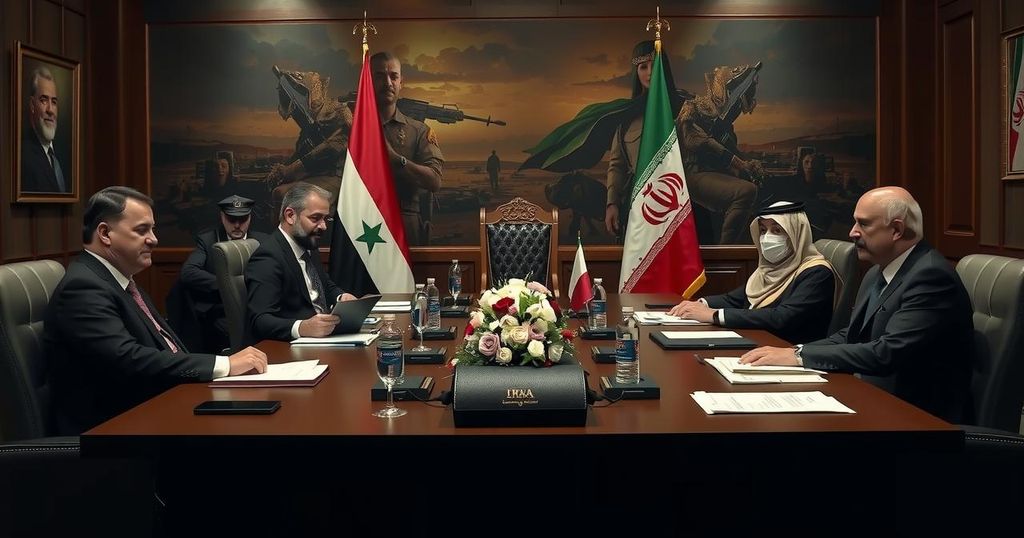Syrian Regime Seeks Regional Support Amid Opposition Advances

The Syrian regime is seeking regional support amid significant losses to opposition forces, particularly in Aleppo. President Assad has engaged key allies, including Iran, Iraq, and the UAE, to bolster cooperation against terrorism and reaffirm Syria’s sovereignty. The shifting alliances indicate a re-evaluation of the regime’s stability and regional dynamics as it confronts new challenges.
The Syrian regime is currently intensifying its diplomatic efforts to consolidate support amid escalating challenges from opposition groups, particularly following the loss of Aleppo and potential threats to Hama. The regime maintains control over western Syria, while eastern regions are dominated by US-backed forces and northern territories fall under Turkish influence, with Idlib controlled by opposition forces. In response, President Bashar al-Assad has sought assistance from prominent allies, including Iran, Iraq, and the UAE, to bolster Syria’s defenses against adversaries.
In recent diplomatic engagements, President Assad reached out to Iranian Foreign Minister and Iraqi Prime Minister Mohammed Shia’ Al Sudani to discuss developments in Syria and strategies for combating terrorism. Both leaders reaffirmed their support for Syria’s sovereignty and cooperation against terrorist activities. In conjunction, Assad also communicated with Sheikh Mohammed bin Zayed Al Nahyan of the UAE, who expressed solidarity with Syria and reiterated the country’s humanitarian commitments aimed at restoring stability and unity within Syria.
The UAE’s support is significant, considering its evolving relationship with the Syrian regime over the past years, illustrating a resurgence of ties among former Arab allies. As Egypt and other Gulf states move to re-establish relations with Assad, the landscape indicates a shift in the perception of the regime’s stability. Given the current vulnerabilities faced by Assad’s administration, it is crucial for Syria to strengthen alliances with Iraq, the Gulf states, and traditional partners like Iran and Russia to navigate the ongoing conflict.
The Syrian conflict, which began in 2011, has shifted the dynamics of regional power and alliances. Initially isolated, the Assad regime has increasingly sought to regain support from neighboring Arab states as the situation in Syria evolves. The recent loss of Aleppo highlights the fragility of the regime’s control and the growing strength of opposition forces, prompting a reassessment of strategies among regional players. The geopolitical implications involve historical rivalries, shifting allegiances, and the broader international context, emphasizing the significance of regional cooperation to withstand external and internal pressures.
In conclusion, the Syrian regime’s recent outreach to Iraq, Iran, and the UAE underscores the urgent need for strengthened partnerships amid mounting pressures from opposition forces. The loss of Aleppo has diminished perceptions of stability within the regime, necessitating a comprehensive strategy to secure support from influential regional powers. As alliances evolve in the Middle East, the future of Syria hangs in the balance, contingent upon Assad’s ability to rally support against a backdrop of ongoing conflict and instability.
Original Source: www.jpost.com








